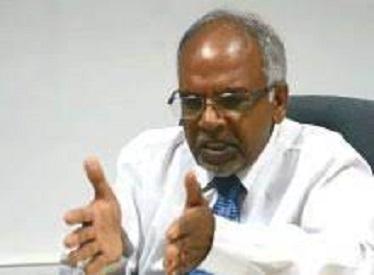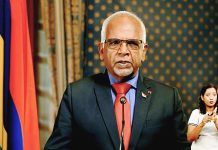Africa-Press – Mauritius. Beyond the obligation to respond to the appeal of the constitutional complaint of Rezistans ek Alternativ against the declaration of ethnicity of the candidates, the Government led by the MSM must present an electoral reform project that can enable it to meet the demands of the MMM for a political arrangement for the 2019 elections.
And, the last position of Paul Bérenger confirming the satisfaction of the MMM on the introduction of a dose of proportional he said, indicates that serious things in terms of “koz-kozé” MMM-MSM could begin as soon as the reform presented. Do you see things moving in that direction?
Dharam Gokhool: After more than 50 years of independence, after numerous reports from specialists and the Mauritian Parliament, after endless public debates on electoral reform, after several proposed bills on the subject (and let’s not forget the Draft Bill for Electoral Reform of the MSM-MMM government in March 2005 and the commitments of the Alliance Lepep in its electoral manifesto to deepen and modernize our democracy), the Lepep government – wedged between the constitutional complaint of Rezistans ek Alternativ and the imperatives of an upcoming electoral deadline – comes to propose this reform.
In view of the timing and the anti-democratic way of proceeding – kui vide –– we cannot hide the electoral concerns on the side of the MSM. The “koz-kozé” of yesteryear on the side of the MMM cannot be ruled out either.
It’s true that lately, Bérenger has been very virulent towards the MSM and the Jugnauths (and with good reason). He showed his determination to lead the MMM alone in the next elections and confront the MSM on several fronts, especially on the issue of money politics.
If he changes posture to “re-koz kozé” with the MSM, the 40-50% of the electorate (especially young people) who are in observation mode, will make him pay a very high electoral price.
But the MMM-MSM “koz kozé” is not to be completely ruled out. We all know Berenger’s way of acting, whether with other parties or the type of attachment he has to the “higher interests of the country”.
Let us not forget that each time he negotiated an electoral alliance, he considered – first and foremost – his personal interests. At least, that is what stands out the most when we analyze the electoral arrangements he has negotiated in the past.
* However, it remains to convince the activists of the correctness of a “remake” with this same MSM which, according to the words of Paul Bérenger, no later than last Friday, during a congress at La Tour Koenig, would incarnate “fraud , scandals and incompetence… MSM sé Money Politics, bez kasse…”.
Bérenger will be able to convince the militants, would you say? It is rumored that Pravind Jugnauth is preparing a “clean-up campaign to karcher” within the MSM, and if it materializes, the MMM could well claim the paternity of such an approach and mount aggressive marketing to rally its militants to a “Re-ReMake MSM-MMM”.
However, faced with a revived Labor Party, the MSM will not be able to present itself to the electorate with a formula for sharing the post of Prime Minister.
The 2000-05 episode with this sharing formula was not very conclusive. Bérenger also knows that it will not be an easy game for the MSM against Labor in the rural regions. As for Bérenger, he could present to the militants a “winning-formula” with the two options: to go alone or to go in alliance with the MSM.
* Therefore, beyond questions relating to the sharing of tickets and, in the event of victory, those relating to ministerial portfolios and other appointments, it is mainly the introduction of a dose of proportional representation that would interest the MMM, more than the post of Prime Minister, it seems.
In the first case, with a dose of proportional representation, the MMM could pull out of the fire in urban areas by counting on a positive spin-off from proportional representation as well as female representation, already displayed.
It will also be necessary to bet on the “mercator” of post-electoral alliances. In the second case, Bérenger could well target a post-election balance of power in favor of the MMM.
He will ensure that Rajesh Bhagwan obtains all the copies of Jean Claude de l’Estrac’s next book entitled ‘Jugnauth-Bérenger: Intimate Enemies’ and distributes them free of charge to activists, advising them to “pran un pé patience” in the meantime. post-election negotiations.
If the MMM displays a certain satisfaction with the introduction of a dose of proportional representation, it is obvious that it will not be difficult to gather a certain number of arguments to convince the militants, either for one or the another option.
* If Paul Bérenger obtains what he has always been looking for: proportional representation, and by pushing the MSM in this direction, and running in the next general elections alongside the MSM as part of an Israeli-style agreement for the sharing of the ‘prime ministership’, it’s screwed up for the PTr, in your opinion?
You are right to point out that Bérenger has always sought proportionality. But as I have already told you, in the context of an MSM-MMM rapprochement, an Israeli-style agreement will not be profitable electorally for the MSM against the Labor Party. The MMM will take the bigger share of the cake.
On the contrary, a Labor Party, reformed with a program responding to the aspirations of the population, in particular, those of the young generation (the millennials), will be a formidable opponent against an MSM-MMM alliance and would have a good chance of winning the elections.
. I will also add that the electorate made up of young people expects the ruling party to bring political and economic stability to the country. I highly doubt that Israeli-style deals or any sort of post-election arrangements are of any interest to them.
* What will happen if the MMM chooses to stand alone in the elections, in a three-way struggle, after it has voted for the MSM’s electoral reform project introducing proportional representation? Will we see a ‘repeat’ of 1976?
I have always thought that, without proportional representation, our electoral system favors pre-election alliances. But, in my opinion, with a dose of proportional representation, the MMM could present itself in the elections.
This is an option not to be ruled out today. In this case, the alliances will take place after the elections, as in 1976. * We know that very often it is during the last week of an election campaign that voting intentions become clearer or that there is a surge of a majority of the electorate in favor of a party or any alliance.
What do the echoes from the field tell you about the mood of the electorate vis-à-vis the MSM at present? I will answer your question in four steps. Confronting the intelligence of the electorate
Ethically and morally, the electorate was very disappointed. I give you an example. The team acclaimed by the electorate brought along the way a change in the level of responsibilities at the highest level of the government hierarchy.
Alliance Lepep thus presented the SAJ/V. Lutchmeenaraidoo duo: SAJ as Prime Minister and VL as Minister of Finance. But, without prior consultation with that same electorate, and without any regard for the sacred vote of the people, this alliance has reneged on its commitment to the people.
There could be two possible explanations. This reflects shortcomings at the alliance level in the distribution of ministerial responsibilities. Would the MSM have realized the incompetence of these two elected officials and decided to modify the configuration?
It is an illegitimate and immoral act to only satisfy personal aspirations and needs. In both cases, the population took good note of this departure from the democratic principles of the Republic.
Then, the MSM had led a vigorous campaign concerning the famous cleanup of rot. But, once in power, there were regularly numerous scandals of favouritism, nepotism and corruption.
In fact, the electorate has witnessed not only broken promises but an increase in such scandals. Coming to power by default, and not by design, is the recipe for powerist excesses.
An economy in distress The MSM has not kept several of its commitments as promised. For example, there was that of bringing the second economic miracle.
Moreover, the performance of the Government has not lived up to the expectations of the population. One only has to leaf through the electoral manifesto of November 2014.
There are many sites where incompetence and amateurism reign supreme. Economy, industry, agriculture, public infrastructure, blue economy, fight against poverty, scourge of drugs.
.
. Damage to the Brand Image of the Republic Several sectors have been affected by a subtle form of decadence. The degradation and incompetence at a high level are palpable in several areas: education, diplomacy, etc.
The institutions of the Mauritian State, such as the Presidency, the prime ministership, and with regard to Parliament, a number of ministers and several honorable members of the National Assembly are under the spotlight for alleged breaches, serious and embarrassing, with echoes on the international level.
.
. On the other hand, with regard to most of our institutions, the 2018 Afrobarometer report establishes a worrying confidence index.
All these scandals tarnish the image of our people and our Republic. It is unprecedented! Unfavorable electoral measures for society Add to all this, interference in institutions, indiscipline, insecurity and concern that continue to gain ground.
I would even say that there has been an exponential increase in cases of violence. The few rare measures and projects with which the Government puffs up its chest do not succeed in alleviating the discouragement, frustration and anger of the population.
This same Government had strongly criticized the measures taken by the former Ramgoolam government but was obliged to refer to the old measures taken, slightly modified them to try to calm the spirits.
Let’s take two examples: the license with points and the speed cameras. In conclusion, as you can see, the mood of the electorate is to punish those who have not honored their commitment.
But that does not mean that this same electorate will blindly endorse any other party that aspires to come to power in the next election. * The report of the Commission of Inquiry into drugs does not seem to have the same psychological shock as that of Sir Maurice Rault tabled in 1986 – it is almost forgotten.
And, despite the many pans that the Government drags behind it, to date, it would seem that the opposition still does not represent a danger for the government alliance. Would there be political data that could significantly shake up the political deal?
It is a paradox: the Government is cornered by a series of pans and will soon suffer the consequences of the “incumbency factor” but the Opposition is unable to capitalize and mobilize those disappointed with the regime in place.
For its part, the Government lives in the illusion of its numerical majority, and thinks that its balance sheet focused on a few large projects will be enough to calm the growing anger and concern in terms of social decline.
On the other hand, no one can offer solutions if we continue to stand still. To parody Einstein, it’s impossible to solve problems with the same mindset you were in when you created them.
Let’s say that we are currently experiencing the calm that precedes the political storm to come. * It is not known if the leadership of this party would be working on any option in case things get complicated for its leader in the Medpoint affair.
But what consequences would a favorable outcome for Pravind Jugnauth have for the MSM – and for the common adversary of the MMM and the MSM, that is to say the PTr, in this case?
It is obvious that the MSM is fine-tuning a Plan B in case the decision taken at the Privy Council is unfavorable to Pravind Jugnauth. Otherwise, if it is a happy ending for him, the political map will be redefined.
Pravind Jugnauth could emerge as a formidable opponent for his eventual challenger. He will have free rein to reshape his party and go after power with more confidence and authority.
In this case, the staffs of the opposition parties will have to get out of their “comfort zone” and return to their respective boardrooms to rethink their strategies.
Everyone will have to show courage, creativity and innovation. It may be a blessing in disguise for the country. * In the meantime, political observers tell us that the silent majority will know how to make its choice in time and place, and that we must reckon with that.
Do you see a gradual transfer of support from the “Labour is better” type to the PTr, and that “by default”? Value of the day, the credible alternative is not there. The silent majority watches. She is still waiting for proposals with credible and honest teams.
The staffs of the opposition parties spend more than 80% of their time criticizing and repeating ad nauseam what the population already knows through the traditional and virtual media.
They expect concrete and direct proposals concerning their concerns. Let me give you a few examples where I haven’t heard the heavyweights of the opposition come forward with solid proposals.
More than 25% of our population suffers from psychiatric problems. Our old people – a majority – live in isolation. The birth rate is down. We spend billions curing disease, not preventing it.
Foreigners invade different sectors of our economy and monopolize unskilled and semi-skilled jobs. Our beaches are shrinking. The quality of our public services is deteriorating.
For every public service, there is a paid private service – for example, private lessons that thrive. Poverty is not going away. Nor is the scourge of drugs. Why ? Income and wealth accumulation is widening the divide beteween the rich and the poor.
* By the way, to see clearly, nothing has changed at the level of our main political parties since December 2014 despite the disastrous defeat experienced by both the MMM and the PTr.
The MSM is a family affair; and we see more people close to Paul Bérenger joining the MMM. The PTr remains under the influence of its leader, like the other parties.
The electorate had yet sanctioned these two political leaders, right? ‘The only constant is No Change’? A situation of status quo, especially in an area as dynamic as politics, is a sign of serious institutional dysfunction.
It is also a sign of a democratic deficit. A government has a responsibility to deepen democracy, not shrink it. This was one of the main commitments of this Government.
Unfortunately, he did not honor it. With the failed attempt to introduce the Prosecution Bill and now bypassing real public debate on the Electoral Reform Bill, they are provoking public opinion further.
And we all know it: people have an aversion to opacity. As for the Opposition parties, they do not seize the opportunity to open up more to the 40-50% of the undecided.
They suffer from a dysfunction that promotes a kind of single thought where the “divergent thinking” so essential for the health and effectiveness of any organization is absent.
This is also a reason explaining that the 40-50% of undecided people keep themselves away from politics. Moreover, the “millennials” reject this culture of deciding everything for them and imposing everything on them.
I do not believe in a “big bang change” à la Trump or Macron. It may be that a dose of proportionality opens the way to new parties that can position themselves on the political spectrum.
But, that being said, and taking into account the political experiences of other countries, I prefer that changes take place within the existing political parties.
* In an interview with the Mauritius Times, Joseph Tsang Man Kin deplored the predominance or domination of “particracy” and “leadercracy” in political life in Mauritius as in other countries elsewhere.
What could explain this state of affairs in your opinion? It is a historical, cultural and ideological phenomenon. Our political system is based on a political model where power is centralized.
Centralization stems from a “scarcity mentality”. Democratization is based on an “abundance mentality”. It is an industrial structure and mode of operation, based on the “divide and rule principle”.
This is not in line with a post-industrial society, where it is not only necessary but essential to mobilize all human and intellectual resources to advance society.
On the other hand, let me quote you this already famous saying: “Politicians often think of the next elections; statesmen think of the future generation.
» Without a “political paradigm shift”, we will miss our appointment with the future of our Republic.
We have already wondered about the renewal of the political class in Mauritius: the very last generation of politicians who present themselves rather as technocrats has not been really encouraging; there were even big disappointments.
What could tomorrow’s political world look like? Charles Gave, economist and financier, explained this: those who do better studies are not the smartest.
And they are not necessarily good decision makers. Looking closely, the latest vintage of our honorable members of the National Assembly, would give proof of the hypothesis of Charles Gave.
In my opinion, there are four types of individuals that we meet in the political world: those who are motivated by strong convictions to serve society;
those motivated by calculations to use politics for selfish and personal interests; and those who start with convictions to serve society but who become easy prey to powerist excesses;
those who start with convictions to serve society but who are also opportunists. We are experiencing a crisis in relation to our political culture. Since it is the people who decide their political choices in a democracy, they must fully assume their civic responsibilities, or suffer the consequences.
The leaders of our institutions should also not be exploited by “vested interests”. This is a big challenge in today’s world but, unfortunately, there is no easy solution. Unless there is a major national surge among the political class as well as among citizens to restore politics to its former glory.
For More News And Analysis About Mauritius Follow Africa-Press







